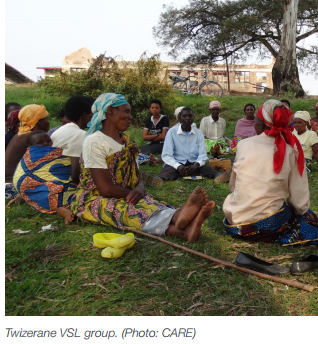A Snapshot of Evaluative Thinking: Gender Analysis in Rwanda
This brief post consolidates the key takeaways from the recent study “Embracing Evaluative Thinking For Better Outcomes,” conducted by InterAction and the Centre for Learning on Evaluation and Results for Anglophone Africa (CLEAR-AA). The case study featured in this post focuses on CARE's work in Rwanda. Most of the text is borrowed directly from the report. To learn more about evaluative thinking and the experiences of the four NGOs highlighted, please download the full report.
About Evaluative Thinking
At any given time, how do we know how effective our strategies, operations, or programs are? In other words, how do we assess the quality and value of our work? How do we know how well we are meeting the needs of those for whom we work? How will we know if our efforts are having any unintended effects, positive or negative, and for whom?
Finding out requires more than simply collecting and analyzing monitoring data or undertaking and using evaluations, since monitoring data on its own might not tell a full story, and evaluations might not anticipate and respond to all relevant questions. We also need to explore questions of quality, value, and importance, as well as how they inform our assumptions, judgments about what is good or not, and decision making.
Evaluative thinking is ongoing, systematic inquiry and learning about quality and perceptions of what is important.
Below is a summary of a case study from an village savings and loan project in Rwanda. It highlights why the organization decided to integrate evaluative thinking into its work, even if at the time they did not necessarily give what they were doing that name. It then describes the organization’s evaluative thinking processes and the decisions they informed; identifies factors that enabled evaluative thinking in the organizations, as well as challenges the team faced; and provides lessons learned useful beyond their organizational contexts. Much more information is provided in the full report.
Case Study Highlights
 CARE conducted a gender gap analysis in its Village Saving and Loan (VSL) program, which required training staff to challenge their perceptions on gender, deeply analyze the VSL methodology in terms of empowering women, and understand how quantitative indicators alone could lead to mistaken impressions of the program’s progress. Using an evaluative thinking process shaped the current VSL programming, turning it into an entry point for integrated interventions for holistic women’s empowerment.
CARE conducted a gender gap analysis in its Village Saving and Loan (VSL) program, which required training staff to challenge their perceptions on gender, deeply analyze the VSL methodology in terms of empowering women, and understand how quantitative indicators alone could lead to mistaken impressions of the program’s progress. Using an evaluative thinking process shaped the current VSL programming, turning it into an entry point for integrated interventions for holistic women’s empowerment.
Process: Social Analysis and Action (SAA) is an approach developed by CARE International to address the social, economic, and cultural factors that influence health. It involves regular dialogue with communities to address how social conditions perpetuate their health challenges. Due to biases found in an initial Gender Gap Analysis, a second analysis was planned to provide an opportunity for an in-depth qualitative exploration of gender dynamics in VSL groups to complement and enrich CARE’s understanding and interpretation of quantitative, end-line survey findings.
Enabling factors: Learning was incorporated into the project design from the outset and had a relatively large budget. Project implementation coincided with an increasing interest in learning within CARE's country office and attracted additional technical support. The Rwandan government also took an interest in the VSL methodology and asked CARE to refine it so it could be integrated into its financial literacy strategy.
Challenges: For evaluative thinking to be successful, staff must have good facilitation skills/techniques, and more well-designed tools to facilitate reflection are needed. There are misconceptions, such as that evaluative thinking requires high-level expertise and complicated analysis, which need to be corrected. Evaluative processes are not built into the design of the projects/programs and are therefore not budgeted for.
Lessons learned: Projects should not solely rely on external evaluations as this can limit staff ownership and learning. Giving staff a document and expecting them to read it, learn, and apply the learning is not effective – participatory exercises are needed to promote ownership. Finally, evidence can help resistant staff to change their minds about what they thought they knew.
Read more case studies in evaluative thinking:
Rights for Vulnerable Populations in Uganda »



